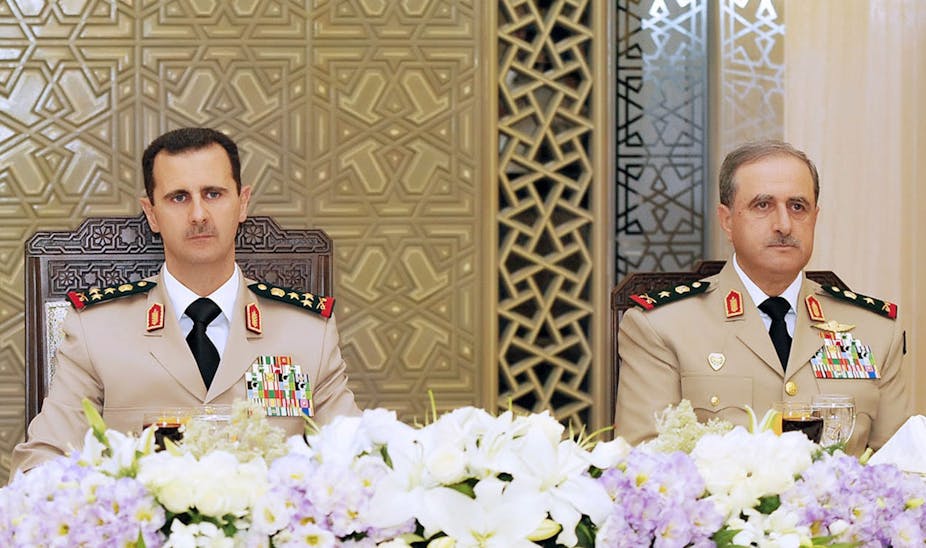In something reminiscent of the plot to kill Hitler with a briefcase bomb, several high-ranking figures of the Assad regime have been killed in an apparent suicide attack. The top level security apparatchiks were at a crisis meeting to deal with the flaring insurrection in Damascus.
Details are sketchy at the moment as to how the attack was carried out and who else might have been injured. Conspiracy theories abound over who is responsible, but if Syria is prepared to announce such a significant strike, one wonders how much worse the reality might be.
While the named dead include weighty titles such as the ministers for Defence and the Interior, it is the more mundane sounding Deputy Defence Minister that was the most significant casualty. Assef Shawkat was married to the President’s sister. He was an important cog in the engine of Syria’s state security apparatus and a close advisor to the Bashar al-Assad. Claiming his scalp is a blow at the very heart of the leadership.
To say that only those most trusted by the inner circle would have access to such a secure gathering is an understatement. For a regime that is paranoid at the best of times, such an infiltration cannot fail to make them become even more isolated from the lower levels of command.
Those with blood ties to the ruling family will circle the wagons tightly, but such a withdrawal might make them too remote to survive for long.
The use of a suicide bomber (if that’s what actually happened) does to some extent play into the hands of the Syrian establishment. They will be able to point a big finger at Sunni radicals and use this as proof that they are fighting against an Islamist terror insurgency. There are still large parts of the Syrian population that live in fear of the country falling into the hands of some type of Muslim Brotherhood group and the pogroms that might ensue.
Meanwhile the fighting as a result of “Operation Damascus Volcano” continues. This is not though a war with front lines. Fire-fights in Damascus do not mean the Winter Palace is about to fall, though the proximity and longevity of this latest flare-up would be troubling to the government.
It’s troubling too for the ordinary citizens caught in the middle. Fighting in dense urban environments with artillery and air support means lots of blood gets spilled accidentally, which ultimately becomes a cynical propaganda factoid for both sides.
The Damascus battles are more indicative of just how widespread the whole campaign of defying the government has become. What we are seeing is not a revolution, but a series of revolutions and micro-wars that have broken out along regional, ethnic, sectarian and even just plain opportunist lines. In a deadly game of “Whack-a-mole”, Assad’s forces are stomping up and down all over the country in a bid to snuff out the threats as they appear.
For 16 months they have succeeded in holding on to control, but can they go on?
Much has been made of the defections of some generals and an ambassador in the last couple of weeks. However, these are not central figures. They are peripheral to the ruling family and the sort of people who would never have become part of the inner circle. For them, their best chance of maintaining elevated status after any revolution is to jump ship and try and ally themselves with a best-chance opposition movement.
At this stage, we haven’t seen the widespread defections and loss of key henchmen that caused former Libyan leader Colonel Gaddafi’s grip on power to disintegrate so rapidly. If and when the rats do start bailing out, we’ll know we are closer to the end.
The disunity of all those opposition movements is one factor that is prolonging the conflict. In the more homogenous nation of Libya, a greater degree of common cause and co-ordination eventually emerged. This and the largely non-urban fighting also made it easier for Western forces to send in the bombers. But with some fairly undesirable elements amongst the Syrian opposition and the intransigence of the Russians, such a clean-cut option is not available in Syria.
But the civil strife in Syria has gone on for too long now for any return to status quo. By not snuffing out the uprising at the start, Bashar al-Assad allowed it to gather enough steam to be self-sustaining.
There seems no doubt that the Syrian ship of state has too many holes to stay afloat. The only questions are how long will it take to sink and how many people will choose to go down with it?

